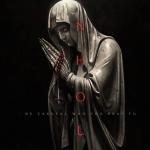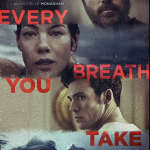A teenager discovers the world of urban horseback riding when he moves in with his estranged father in North Philadelphia.
Chuck says:
Sadly, Ricky Staub’s Concrete Cowboy has an all too familiar ring to it, as it recounts the story of an angry young, African-American man, his estranged father and the temptation of the street where cheap yet dangerous salvation lies. And yet, there’s an urgency to this tale, the vibrant nature of its telling making it vital, necessary viewing thanks in large part to the exceptional work of its cast, the authenticity of its setting and the passion through which it is told.
Cole (Stranger Things’ Caleb McLaughlin) is a teenager with little direction, always in trouble, lashing out without knowing why in a world where he feels alone, out of place. At her wit’s end, his desperate mother (Liz Priestly) sends him to live with his father Harp (Idris Elba) in Philadelphia. This is not a situation either of them welcome, the young man’s ire towards his father for having left him obvious. As for Harp, while concerned for his son, he has not clue about how to be a father.
However, they bond over an unexpected source – horses. Harp belongs to a small, proud community that cares for and rides horses in the City of Brotherly Love, staunchly holding on to a part of its proud past that’s in danger of being forgotten. Operating a series of stables that have seen far better days, the group holds true to the heritage of their ancestors, the true cowboys that history has forgotten and modern gentrification threatens to wipe out.
Such a community does exist and Staub wisely shot the film on location, employing some of its residents in key speaking roles. The resulting verisimilitude engulfs the viewer and goes a long way towards our being able to distance ourselves from the cliched plot points that pop up throughout. Cole is tempted to hit the streets with an old friend (Jharrel Jerome) who runs drugs for a local pusher and he falls to temptation though being warned by his father again and again to steer clear of this bad apple. And if you were to say, “Well, I’ve heard that before,” while listening to the arguments Harp and his son engage in, no one would say that you’re wrong.
And yet the argument can be made that these moments sound familiar because they’re real. So much of the anger father and son direct at each other is based on feelings of displacement, the fact that neither have any familial roots and what connection Harp has to the community of horse people, is threatened by a lack of financial means to support it. Their one-step-forward-two-steps-back approach to one another feels genuine in large part to the fine work of McLaughlin and Elba, the anger and passion they feel for one another palpable. A scene in which the young man finds out about the source of his name is a master class in underplaying, the pair delivering a scene of profound heartbreak and some hope.
To be sure, by the end of Concrete Cowboy, Philadelphia’s cowboy culture does seem to be on the edge of extinction. Yet as Harp points out, it’s what you carry within and the example you set that helps maintain a way of life in the face of ignorance and “progress.” This is the lesson Cole takes with him. As a result, Harp has salvaged that which is dear to him for at least one more generation, hoping against hope it will be sustained and perhaps flourish once more.




